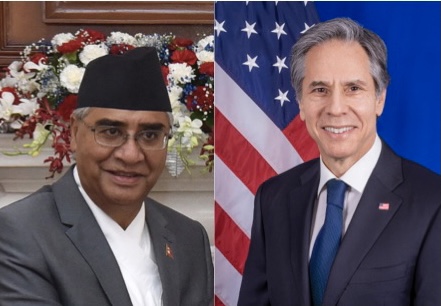Summary
American Secretary of State Antony J Blinken’s telephone call and discussions with Nepal’s Prime Minister Sher Bahadur Deuba on 27 July 2021 could bring Nepal closer to the United States. While China may be concerned with this recent development, it is not likely to have a significant impact on Kathmandu’s relations with Beijing.
On 27 July 2021, United States (US) Secretary of State Antony J Blinken had a telephone conversation with Nepal’s Prime Minister Sher Bahadur Deuba, just as the former started his two-day visit to India. During their call, Blinken and Deuba emphasised the importance of the US-Nepal partnership and discussed the US’ donation of 1.5 million vaccines and other COVID-19 related assistance to Nepal. The US had provided 1.5 million doses of the single-shot Johnson & Johnson vaccine to Nepal in July 2021 under the COVAX facility which aims at equitable access to COVID-19 vaccines. This initiative is co-led by Gavi, Vaccine Alliance, Coalition for Epidemic Preparedness Innovations and World Health Organization, alongside key delivery partner, theUnited Nations Children’s Fund. During the conversation, Deuba expressed his appreciation for the support provided by the US government and requested for further assistance of an appropriate number of doses of vaccines to cover children and youth. This would enable it to be better prepared to tackle the widely speculated third wave of the pandemic. The two leaders also discussed the issue of global warming and climate change and their impact on vulnerable countries like Nepal.
The US’ attempts to develop close ties with Nepal did not find an appropriate response from Kathmandu under former Prime Minister, K P Oli. For instance, in June 2019, the US Department of Defense published the Indo-Pacific Strategy Report (IPSR), which sought close engagement with Nepal. The IPSR stated that the US “…seeks to expand our defense relationship with Nepal, focused on HA/DR [Humanitarian Assistance/Disaster Response], peacekeeping operations, defense professionalisation, ground force capacity, and counter-terrorism. Our growing defense partnership can be seen in the establishment of the US Army Pacific-led Land Forces Talks in June 2018, our senior-most military dialogue with Nepal. This year [2019] has already seen several senior-level visits to Nepal by the USINDOPACOM Commander and Deputy Assistant Secretary of Defense for South and Southeast Asia to further advance our defense relationship.”
However, on the IPSR , ministers and officials in Oli’s government stated that Kathmandu would not join any military alliance targetted at China. Even the Chinese urged Nepal not to join the US in its Indo-Pacific ambitions which Beijing claimed is aimed at containing China. Moreover, assuring China, during a meeting between the Chinese Foreign Minister Wang Yi and Oli in September 2019, Nepal maintained that “the Nepali side is opposed to any attempt to contain or thwart China’s development.”
After Deuba became Prime Minister in July 2021, there have been expectations of some change in Nepal’s foreign policy. However, many in Nepal’s political and diplomatic circles believe that Deuba’s foreign policy will largely be guided by mutual friendship and cooperation with all. It is unlikely that Nepal’s ties with China will see any upheavals.
On 19 July 2021, a day after Deuba won the vote of confidence in the Lower House of the Parliament in Nepal, in an opinion piece published in Global Times, Zhang Jiadong, Professor at the Center for American Studies, Fudan University, while analysing American Ambassador Randy Berry’s tweet congratulating Deuba, and Indian Ambassador Vinay Mohan Kwatra’s visit to the Nepali Prime Minister’s residence, wrote, “Their [India and the US] eagerness to promote ties with the new prime minister is quite obvious”. He added, “…No matter who comes to power, they cannot lead the country toward prosperity without cooperation with China or avoid the influence of India…Deuba’s rise to power may tilt Nepal a bit toward India, but he will not change the basic idea of multilateral balanced diplomacy between China, India and the third-party countries”.
While the Nepali Congress has cordial relations with China, two recent incidents have made Beijing wary of the party’s intentions. First, in 2016, during his visit to Goa to attend a conference on democracy as Nepali Congress’ President, Deuba was photographed along with Lobsang Sangay, Prime Minister of the Tibetan Government in Exile. Deuba, however, denied that he met the Tibetan leader. He also reaffirmed his party’s commitment to the ‘One-China’ policy. And, in 2020, the Chinese embassy in Kathmandu complained to the Nepali Congress after the party’s provincial lawmaker Jeevan Bahadur Shahi visited what Beijing sees as a “disputed territory” in Humla in Nepal. It was the first time that the Chinese embassy had written directly to any political party which is viewed as an “undiplomatic exercise”. The two issues, however, died down soon.
Given the ongoing tensions between Washington and Beijing, it will be tough for Kathmandu to choose between one or the other. It will require much diplomacy and great astuteness for Nepal to balance its relations with the two countries. In the meantime, Beijing remains wary of its ties with Himalayan kingdom.
. . . . .
Dr Amit Ranjan is a Research Fellow at the Institute of South Asian Studies an autonomous research institute at the National University of Singapore. He can be contacted at isasar@nus.edu.sg. The author bears full responsibility for the facts cited and opinions expressed in this paper.
Photo credit: Wikipedia
-
 More From :
More From :
-
 Tags :
Tags :
-
 Download PDF
Download PDF


